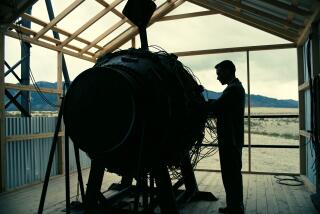War Claims Called Unfair : BBC’s Film on Hirohito Denounced by Japanese
- Share via
TOKYO — The Foreign Ministry charged today that a British television documentary blaming the late Emperor Hirohito for the attack on Pearl Harbor contained serious mistakes.
The British documentary, titled “Hirohito: Behind the Myth,” charges that the emperor knew in detail about Japanese plans during World War II and could have called off the attack on U.S. forces at Pearl Harbor that launched Japan’s war against the United States.
A Foreign Ministry spokesman, Yoshifumi Matsuda, said the program, produced by the British Broadcasting Corp., is “unfair” and ignores evidence that Hirohito tried to stop Japan from going to war.
“It’s not a bad film as a drama but it is a prejudiced film as a documentary and a poor film as an academic work,” Matsuda said.
Hirohito died Jan. 7 of intestinal cancer at age 87.
His wartime role has never been fully addressed in Japan and remains a taboo topic for many Japanese.
The television program, shown in Britain on Tuesday, was made by Edward Behr, a Paris-based journalist.
In the program, he challenges the image of Hirohito as a figurehead who reluctantly went along with the military’s war plans. He quotes a diary kept during World War II by the Lord Privy Seal, Koichi Kido, as saying Hirohito “was smiling broadly and tearful with joy” at hearing the news of Japanese conquests in Southeast Asia.
“That is entirely wrong,” Matsuda maintained. He said the Foreign Ministry had examined the diary and other records, and “on that day, there was some conversation between the emperor and Mr. Kido, but the one who cried was Kido himself, not the emperor.”
‘It Ignores Evidence’
“I don’t know what translation he (Behr) used, but there are many of those sorts of misunderstandings, wrong interpretations and so forth” in the program, the ministry spokesman said.
“This film deals with history in an unfair manner in the sense that it picks up documents and commentary which agree with his view and he ignores all other evidence to the contrary,” Matsuda said. “It ignores evidence that the late emperor privately tried very hard to prevent the war.”
The BBC has sold the documentary for broadcast to television stations in Australia, Austria, Canada, Hong Kong, Israel, South Korea, the Netherlands, Norway, Spain, Sweden and the United States.
Matsuda said Japanese television stations will be free to broadcast the program. However, an official at the Japan Broadcasting Corp., which often uses BBC programs, said it has no such plans.
More to Read
Sign up for Essential California
The most important California stories and recommendations in your inbox every morning.
You may occasionally receive promotional content from the Los Angeles Times.













